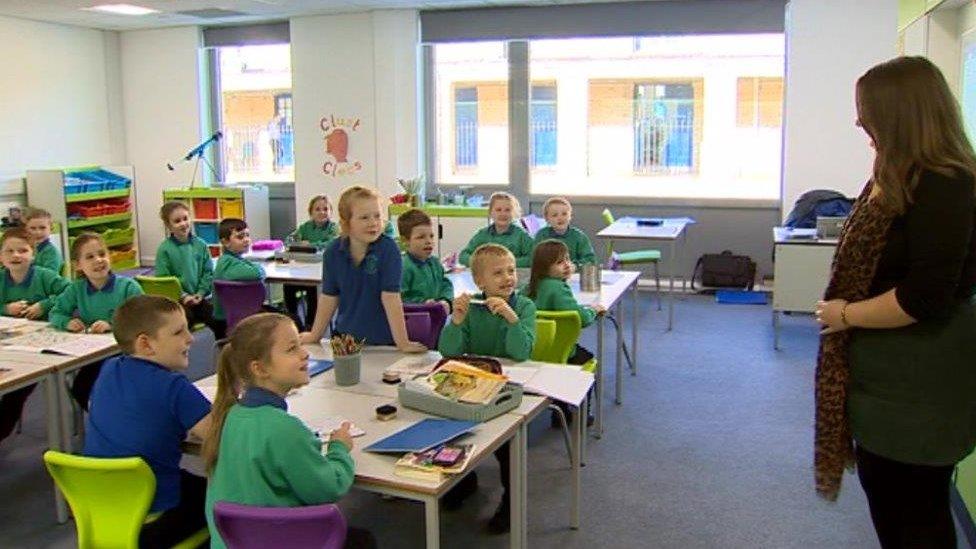£40m spent on supply teachers in Wales, latest figures show
- Published

A pilot project is running where schools club together to employ supply teachers who are "part of the team"
About £40m was spent by Wales' schools and councils on supply staff, according to figures.
Carmarthenshire paid the highest amount on supply staff, spending £4.9m in 2016-17, while the £595,000 Denbighshire paid out was the lowest.
It comes as union UCAC urged the Welsh Government to continue funding for a project where schools club together to employ supply teachers directly.
The Welsh Government said it was keen to learn lessons from the pilot.
It has spent £2.7m on the pilot project, which involves 50 teachers and 106 schools and was set up to address long-standing concerns about the pay and conditions of those doing supply work.
The teachers are employed full-time and if none of the schools need cover they do other work, such as lesson planning.
Education Secretary Kirsty Williams said she would look at rolling out the project, which is due to end in August 2019, longer term.
A spokeswoman for teaching union UCAC said supply teachers tended to be treated "exceptionally poorly in terms of pay, working conditions and with a general lack of respect".
She said: "The pilot scheme seems beneficial, ensuring a fixed period of work for newly qualified teachers, and stability and flexibility for schools in terms of the supply teachers they use.
"It is difficult to imagine schools, in the current economic climate, being able to continue the arrangement at their own cost, so we are urging the Welsh Government to continue the funding that makes this possible."
Ms Williams said supply teachers should be well supported and remunerated and the Welsh Government was looking at new ways to ensure they are treated fairly, including minimum standards and accreditation for agencies.

Supply teacher Ffion Davies says the scheme means she can be well prepared for lessons
Aled Maddock, assistant head of Ysgol Gymraeg Ystalyfera Bro Dur comprehensive in the Swansea valley, said the project provided continuity for children.
The school runs a cluster for 11 schools and six teachers in Neath Port Talbot.
Ffion Davies, one of the teachers, said: "I don't feel like a supply teacher because I'm part of the team. I know the children in every class."
This also made it easier for the school, she said, because they know she will be able to take charge of a class.

Analysis
By Bethan Lewis, BBC Wales education correspondent
Covering teacher absences whether due to sickness or training courses inevitably comes at a cost.
Not all councils were able to provide BBC Wales with complete data for the past five years, so we cannot tell from the figures whether the bill has grown - but that seems to be the general view.
However we can see there are big variations in the supply bill for different council areas.
At the moment the pilot project, which sees clusters of schools sharing a pool of teachers, is saving schools money because the government is covering most of the costs.
That level of funding is unlikely to carry on long term but supporters of the scheme say its "value" is more important than the "cost".
If it does carry on in some way it will probably be one measure and not an "all-Wales" answer to long-standing concerns about how the system works.
About 50 agencies provide supply teachers while some schools employ teachers directly to cover lessons.
Agencies are still likely to have a key role, but Education Secretary Kirsty Williams says she is looking at stricter rules for how they operate.
- Published17 November 2018

- Published14 November 2018

- Published13 November 2018
